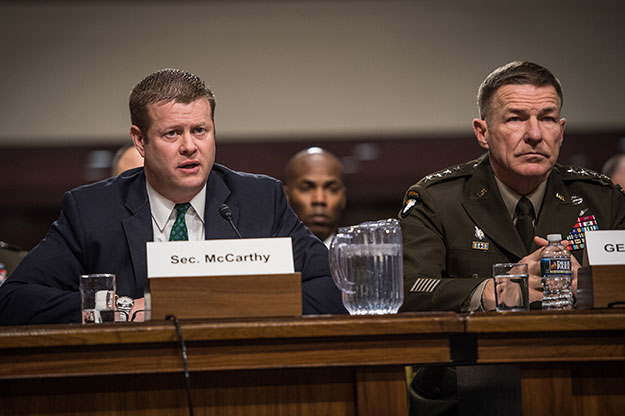(Photo: Secretary of the Army Ryan D. McCarthy and Chief of Staff of the Army Gen. James C. McConville, along with other service secretaries and chiefs, speak to the Senate Committee on Armed Services during a hearing on privatized housing in Washington, D.C., Dec. 3.)
The Army's top leaders updated lawmakers Tuesday on progress being made to fix problems seen in privatized military housing.
In his opening statement, Secretary of the Army Ryan McCarthy restated the Army's "serious commitment" to offering quality housing to soldiers, civil servants and their families.
"It is our responsibility to provide housing, not simply to code but also to quality," he testified before the Senate Armed Services Committee on Capitol Hill.
The current housing crisis, he said, must be fixed using a house-to-house approach, in addition to correcting the governance model and underlying issues to ensure systemic change.
Earlier this year, Army senior leaders placed housing as the number-one priority for quality of life, following complaints of health concerns inside homes and mismanagement of housing contractors.
In the past 10 months, the Army identified governance flaws, initiated commander-driven town halls and created 24-hour helplines to hear feedback directly from families, McCarthy said.
"We have empowered the chain of command as part of the solution, created transparency of the work order process, and ultimately, sought to regain the trust of the men and women in our ranks and their families," he said.
Backing these efforts, housing operations have now been assigned to the commander of Army Materiel Command, Gen. Gus Perna, who has delegated authority to slash incentive fees for housing contractors.
"We developed new incentive fee metrics measuring work order response times, work order repair quality, and resident satisfaction that will allow us to withhold fees for substandard performance," McCarthy said.
Incentives have already been cut for poor performance at Fort Benning, Georgia, and Joint Base Lewis-McChord with possibly more to come across Army installations in the near future.
A new incentive fee award structure is also expected to be released January 1, he added.
The average incentive fee now stands at 77 percent, with the lowest at 11 percent, said Army Chief of Staff Gen. James McConville, who also attended the hearing along with other military senior leaders.
"We see that making a difference in the performance of the contracts," McConville said.
BUDGET STANDSTILL
A tri-service Resident Bill of Rights is also awaiting to be published once Congress can pass the National Defense Authorization Act.
In it, there are 12 rights intended to protect residents of privatized military housing.
McCarthy highlighted dispute resolution as one of the rights that should greatly benefit residents.
"When the Bill of Rights is published, I think the dispute resolution is one, in particular, that we need to put in place as quickly as possible," he said. "It's why in many cases that the only mechanism that families have to get results is legal action. So the sooner we can have a dispute resolution in place, it will help improve matters dramatically."
About $1.1 billion in budget requests to improve housing is also being held up while the government operates under a continuing resolution.
"We cannot start the projects, we cannot initiate the projects. We don't have the funding," McCarthy told lawmakers, adding in some cases it affects current projects.
NEED FOR NEW HOMES
Today, nearly half of the force lives on post.
Since February, over 2,200 families had to be temporarily displaced as a result of issues inside their homes. About 180 families are still in temporary housing while private-sector companies carry out work orders.
"To displaced families, days can feel like weeks. And weeks can feel like months," McCarthy said. "These aren't simply numbers; these are lives."
The Army has over 86,000 privatized homes. Of those, one-third need to be rebuilt and another one-third need minor repairs.
Some issues have involved lead paint, mold and other toxic hazards, especially in older homes found across installations.
McConville said some older homes are difficult to refurbish and cannot be torn down since they are considered historical.
"We need to modernize them," he told lawmakers. "Lead is a huge issue and we're very, very concerned for our families."
Due to the historical standards of the homes, only about 10 of them can be remediated each week, he added.
"It's going to take us some time," he said. "It's going to take us two to three years with these homes to get them to the level that we want them to be."
While "significant strides" have been made to improve housing over the past year, McCarthy noted the finish line is still not in sight.
An overall analysis of the Army's privatized housing requirements is currently underway, he said, and is slated to be completed by the spring.
"The Army is resolved in our commitment to providing safe, quality, and affordable housing to our soldiers and their families," he said. "But much more work remains."






Read Comments